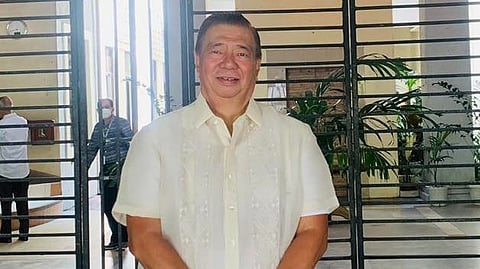
- NEWS
- the EDIT
- COMMENTARY
- BUSINESS
- LIFE
- SHOW
- ACTION
- GLOBAL GOALS
- SNAPS
- DYARYO TIRADA
- MORE

A special session that President Ferdinand Marcos Jr. can call will settle the issues surrounding the impeachment of Vice President Sara Duterte, including the current status of the Senate, a former senator said Wednesday.
Former Senate President Franklin Drilon said in a forum hosted by the University of the Philippines College of Law that once Marcos calls for a special session, the impeachment proceedings will roll before the start of the 20th Congress on 30 June.
“I have asked the President to call a special session, even if you don’t include the impeachment trial as an item in the special session,” Drilon said.
“When the President calls the Senate into a special session, the first item on the agenda is the consideration of the impeachment complaint filed in the House, and that will be referred to the impeachment court,” the former lawmaker explained.
The Senate is on recess until 1 June in preparation for the midterm elections.
Drilon noted that once Marcos greenlights the special session, the impeachment trial must immediately follow, as the Constitution mandates.
Drilon, who participated in two impeachment proceedings, said the campaign period for senators seeking reelection is “not a valid reason” to delay the impeachment trial.
“The campaign period is not a valid reason to postpone, and in fact, there should be no circumstance to justify a deferment, because the Constitution mandates the performance of a constitutional duty forthwith,” Drilon emphasized.
With discussions on the potential effects of Duterte resigning before the impeachment proceedings could begin, former Associate Justice Conchita Carpio-Morales said that stepping down from a government position does not exempt one from facing administrative charges.
“An official may resign if he or she wants to, but if the official is aware of the impending cases, he or she is still within the active jurisdiction,” Morales said.
She noted that the jurisdiction is effective even if the administrative case has not been filed.
Former Supreme Court spokesman Theodore Te supported Morales’ claim, emphasizing the importance of a trial despite a resignation to ensure accountability on the impeachment’s initiative.
“It will just remove every attempt to make a public official accountable. The public official evades the removal and also evades the disqualification,” Te said.
Once an impeached government official is “convicted” by at least two-thirds of the Senate votes, the official will be ousted and be permanently disqualified from public office.
Vice President Duterte’s camp has filed a petition before the Supreme Court questioning the constitutionality of her impeachment.
30
